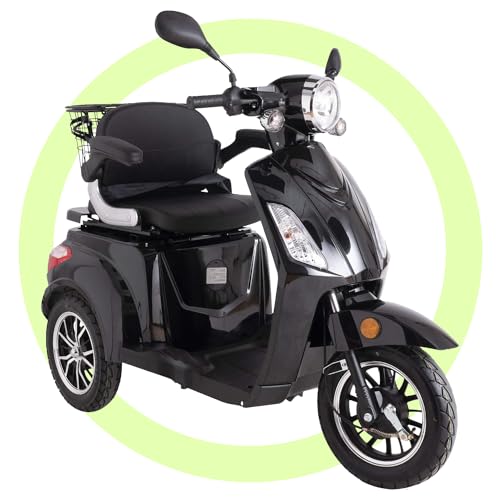Scooter Green Power
Scooters provide an enjoyable and secure way to travel. Scooters are also environmentally friendly. However, it's important to do your research prior to purchasing one.
Scooters are not carbon-free as they appear. They come with hidden costs. The mining and production processes used to produce the batteries to power electric scooters create significant amounts of carbon dioxide. Transporting scooters from places where they are used to charging stations adds to their environmental footprint.
Battery Life
The battery is one of the main components in any scooter, and it can have a big impact on how green your scooter is. When the battery dies it releases toxic chemicals which could have a massive ecological and economic impact.
Electric scooters are extremely efficient in energy use. They consume a fraction of what cars do to travel the same distance. This can reduce the amount of pollution that is emitted into the air and also reduce climate change, and can also help avoid traffic congestion. However, they do produce little carbon dioxide when charging. If the energy is derived from renewable sources, it can make electric scooters even greener.
Many scooters also come with interchangeable batteries that can be used to recharge other scooters within a fleet. This means there is less requirement for companies to transport their scooters to recharge. Some companies are also testing with hyper-local energy production, which allows the grid to utilize the power stored in the batteries to balance supply and demand.
If you intend to use your scooter for long excursions you should consider purchasing a larger battery or a second battery that you can swap out. You will be able to travel for longer distances without having to recharge the battery so often. This is especially important especially if you live in an area that is subject to extreme weather conditions. It is also a good idea to charge the battery prior to when you store it for months or even weeks. If you don't do this, it could cause the battery to stop keeping a charge until you require it which could be frustrating and potentially dangerous.
In general, electric scooters are much more environmentally friendly than other vehicles or modes of transportation. They produce fewer greenhouse gases that contribute to global warming, and they require less raw materials to manufacture. They can be charged with clean energy which can reduce their carbon footprint. However, it is crucial to consider the entire life of a scooter when assessing its sustainability. This includes the manufacturing process, the energy used to charge it, and its disposal.
Design
Electric scooters' design can have a significant impact on their green credibility. Scooters with regenerative brake systems, like, can convert energy that would be wasted otherwise into battery life, which allows them to travel further on each charge. Many scooters can be adapted for shorter distances, thereby reducing the number of car trips required. And, unlike traditional vehicles, scooters emit no carbon dioxide during use.
It is nevertheless important to consider the environmental effects throughout the lifecycle of an electric scooter. This includes the extraction of raw materials, the manufacturing and the disposal at the end of life. green power electric scooter of lithium-ion batteries is especially energy intensive, and can cause habitat destruction as well as water and soil pollution, and greenhouse gas emissions. The mining and transportation raw materials can have a significant effect on the environment.
Another problem with scooters is their shaky durability. The average scooter will last approximately a month or two on the streets before it is discarded. This could require scooter companies to extract more aluminum and engage in more shipping and other activities that consume resources. And, since most scooters are rented, not owned, the scooters must be collected and transported to recharging stations (often by cars) when they are empty of juice.

At the time of end of life, scooters could contain hazardous waste that could cause harm to public health and the environment. If not recycled properly, the waste can end in rivers or landfills and cause harm to humans and wildlife.
Scooters are better for the environment as a whole than traditional vehicles in general. However there are a few issues that need to taken care of before they can be considered completely eco-friendly. If all scooters were built with 100% recyclable materials, and if the power they ran on came from renewable sources, then they would be a carbon-free method of transportation.
Maintenance
A scooter powered by electricity may be less expensive than a traditional vehicle but it requires regular maintenance. The battery pack is the main element to be considered. It needs to be replenished frequently and charged when it is nearing the expiration date. The speed controller also plays a role in this as well. This will affect the performance when it is faulty.
If the scooter stops or stops while riding, this usually indicates a problem with the battery pack. It could be a fuse or a charger that doesn't work properly. Make sure that the charger's light are green (charging) and not red (off). It's a good idea to recharge the scooter every time it's in storage, even if you're not using it.
Another issue that is common is a faulty normally closed brake lever switch. To test for this, unplug the wire from the brake lever switch and connect the terminals in the controller's connector the wire is disconnected from. If the scooter continues to run without stopping, the switch is defective.
In the course of the day, scooter services provide people with the ability to drive cars or trucks and then return to their workplaces any electric scooter that has run out of power. This type of service helps to keep the fleet in working condition. It also lets them charge the batteries before the next trip. Many consumers do not have this luxury, and must change their scooters if they run out of juice.
